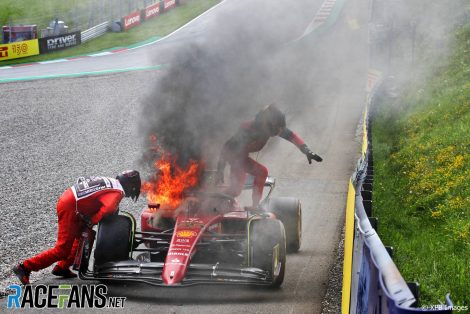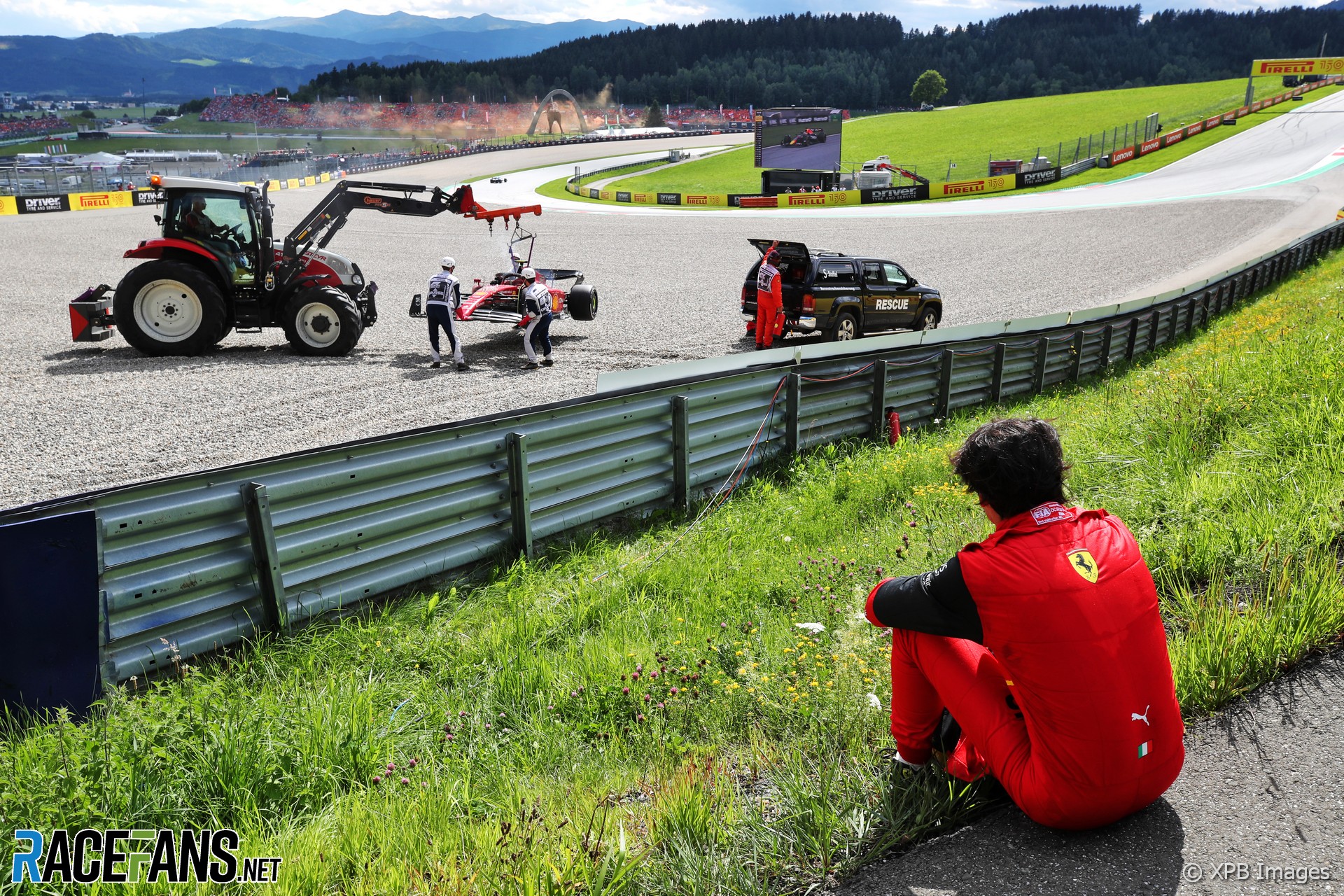Ferrari suspect the engine failure which put Carlos Sainz Jnr out of Sunday’s Austrian Grand Prix was a repeat of a problem which caused another retirement three races earlier in Azerbaijan.
Charles Leclerc dropped out of last month’s Azerbaijan Grand Prix while leading, due to an engine failure. Yesterday Sainz’s car came to a stop with 15 laps to go with an engine problem which quickly turned into a major fire.Ferrari team principal Mattia Binotto explained the internal combustion engine has been responsible for two of the three race-ending power unit failures the team has experienced this year.
“I think we’ve got only two engine failures so far,” he said. “Obviously ‘power unit’ [failures], more than two, but in terms of internal combustion engine, two.”
Binotto said the initial indication is Sainz’s failure shared the same cause as Leclerc’s previous one.
“Obviously, we need to look at what happened today. Is it the same we had already as the one in Baku with Charles? Very likely.

“But we have new elements and I know how strong they are working, how good they are, and then I can count on them that it will be addressed very soon, hopefully as soon as possible.”
Leclerc said the failure is “definitely a concern” for the team.
“We need to look into that and make sure that it doesn’t happen. Obviously it happened twice on my side in the last five races and now Carlos again. So we need to get on top of this as quickly as possible.”
Advert | Become a RaceFans supporter and
2022 Austrian Grand Prix
- FIA affirms three sprint races on 2023 Formula 1 calendar
- “Oh, so unlucky!” How Alonso’s cursed Austrian Grand Prix unfolded on his radio
- Ferrari believe their performance deficit to Red Bull is now “negligible”
- Another fan’s experience of harassment last weekend – and why F1 must act
- AlphaTauri “desperately” need upgrades after “disaster” weekend, urges Gasly





BasCB (@bascb)
12th July 2022, 7:17
Yes, that would defenitely be a concern off course.
ruliemaulana (@ruliemaulana)
12th July 2022, 7:30
Absolutely a concern, for sure.
SjaakFoo (@sjaakfoo)
12th July 2022, 9:33
Clearly pushing the engines way beyond their limit. So they either go slower than Honda and lose out on track, or just risk blowing up an engine every other race. A hard choice, indeed. Either way, it’s bad for the championship challenge.
Christopher Rehn (@chrischrill)
12th July 2022, 10:34
It’s either to make a fast but unreliable engine reliable than make a slow but reliable engine fast! Definitely bad for 2022, maybe bad for 2023 too, but likely great for 2024 and 2025.
MacLeod (@macleod)
13th July 2022, 8:44
Yes but you need to make the engine reliable when you have a fast engine that could cost performance but it doesn’t mean it has to cost performance. Or if not possible turn the engine a tad lower (95%) in stead of full power.
Jelle van der Meer (@)
12th July 2022, 10:24
Curious how the FIA looks at the cost of all those extra engines and components, are those suppose to be paid out of the budget cap?
For sure replacing the bodywork on that partly burned out car will carry a price tag for the team as well.
Christopher Rehn (@chrischrill)
12th July 2022, 10:33
Engines are not included in the cost cap, no. This is to balance the budgets of engine customers vs engine manufacturers. You develop the engines separately, then every team (including Ferrari) “buys” them for a set price. In this case, Ferrari pays per engine but only a set token price, no cost for the development since it’s not tied to the team.
Same goes for all manufacturers. Red Bull does not pay for their development, Alpine does not pay for theirs, Mercedes does not pay for theirs. They all do pay the same price as their engine customers for every part of the engine.
SteveR
12th July 2022, 15:06
I believe engine are a fixed cost set at $10 million for the season. Not sure how extra units work.
DaveW (@dmw)
12th July 2022, 14:56
It’s amazing to see a proper kablamo like that these days, especially with the low revs being run now. Ferrari may be taking a lot of grid penalties soon.
I have an opinion
12th July 2022, 23:51
Does this allow Ferrari to “unfreeze” its engine development in the name of reliability?
MacLeod (@macleod)
13th July 2022, 8:47
Yes there is no freeze for fixing reliability that why Mercedes and Hond euh Red BuLL could little chances in the begin of the season. (due the extra fuel addon was too agressie for the engine)